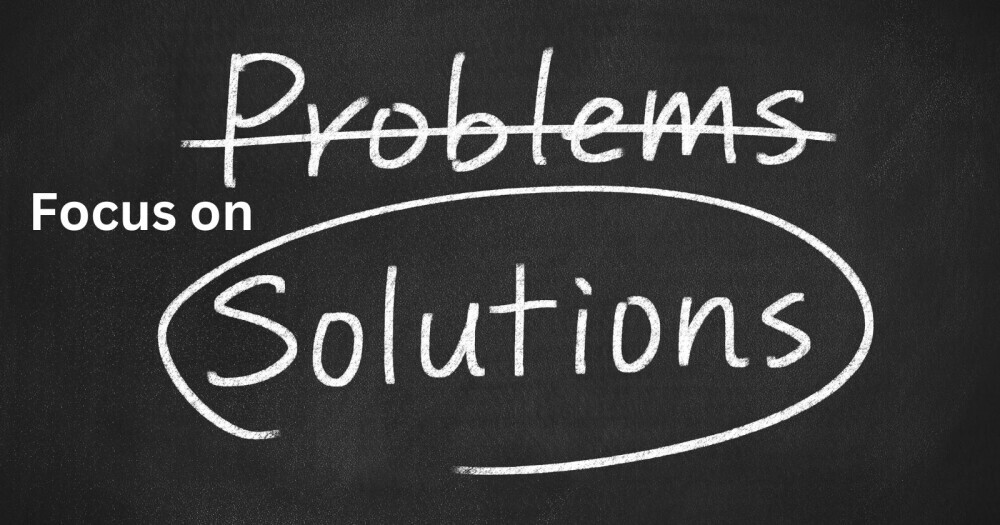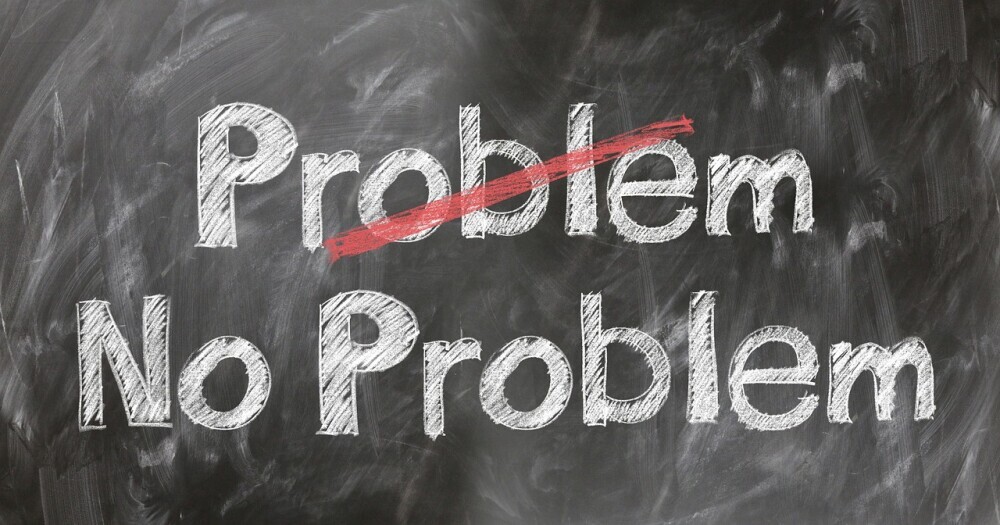Let’s look at how to focus on solutions rather than the problems that we always seem to get stuck on. As you already know, life is always going to be filled with ups and downs, highs and lows, as well as good times and bad. Although it is completely normal to experience these ebbs and flows in life, you also need to know that going through tough times doesn’t necessarily make these low points in life easier to handle. Many people find themselves struggling to get through life’s problems and setbacks.
One of the biggest reasons why many people find it so hard to work through life’s problems is the human tendency to fret and obsess over them. Many people struggle to unfocus their attention from the situation itself so they can actually begin to solve problems.
This is understandable – life’s problems can be shocking and upsetting, making it tough to focus on anything else besides what is happening. However, learning how to refocus your attention on possible solutions is vital.
When you learn how to focus on solutions versus your problems, real healing and progress out of your low point can begin.

Why Is It So Easy To Focus On Problems?
Why do people tend to focus on their problems so much?
There are many reasons why people do this, despite all the negative consequences doing so can cause. For example, consider these common reasons why people find it easy to focus on their problems versus solutions:
Reason No. 1:
Focusing on what happened is a common initial reaction to experiencing a problem.
After something bad or challenging happens in your life, it is pretty normal to focus on all the details surrounding the problem at hand. Most people probably spend at least some time focusing on what transpired. Many people find themselves stuck in this stage, unable to advance any further than reflecting on their experience, thinking about the details over and over again.
Reason No. 2:
Focusing on problems often seems easier than trying to actually deal with them.
The thought of trying to solve a problem can feel overwhelming, especially if the problem is big.
Sometimes, people can feel so completely overwhelmed with what’s happening that they choose to instead keep focusing on the problem itself.
Reason No. 3
Focusing on problems can distract yourself from the work required to fix them.
Solving problems can be an incredibly difficult task. So difficult, in fact, that people often choose to focus on the problems themselves instead of trying to determine viable solutions. By focusing on problems – including the events of what happened, the injustices committed, and other details – you can take the attention away from actually needing to brainstorm and enact possible solutions.
Are You Tired Of Focusing On Problems?

Get Ready To Become Solution-Oriented
Focusing on your problems can be a tough habit to break. As outlined above, there are some common reasons why focusing on problems can seem like an easy and tempting method of “handling” them. However, learning how to become solution-oriented is the true way you can learn how to work through your problems for good and actually take care of them rather than merely brushing them aside.
If you are ready to become a solution-oriented person, consider adopting these strategies to get started:
Give yourself a set amount of time to process emotions you’re feeling due to a problem in your life.
When new problems arise, you may feel emotional. Many people experience a myriad of big, challenging emotions when they are coming to terms with the existence of a new problem in their lives, and that is totally normal. However, you can’t let these big emotions overshadow the importance of moving forward – doing so can keep you focused on the problems.
Give yourself a set amount of time to process and feel those emotions. At the end of that time, turn your attention toward ways you can possibly begin to work through the problem.
Reframe the way you perceive life’s problems.
Many people view their problems as roadblocks that totally stop them from moving forward in life. When they experience a new problem, they stop dead in their tracks, as if they cannot possibly move forward in life with this new problem blocking their way.
Instead of seeing your problems like this, try reframing them as challenges rather than permanent roadblocks. Doing so can help you begin to brainstorm ways to work through them rather than feeling totally stopped by them.
Break down the problem you are experiencing.
It is easy to see a problem as a big, hulking, towering blockade that stops you from living your life. Instead of seeing your problem as one whole, insurmountable obstacle, attempt to break it down into smaller parts.
Often, problems can be broken down into smaller issues that can be solved one at a time. By breaking these big problems down into smaller pieces, you can shift your focus toward handling one small task at a time rather than a whole, giant one.
Spend more time around positive-minded people.
If you tend to hang out with a bunch of negative naysayers, you may be looking directly at why you tend to focus on your problems rather than solutions.
Negative people tend to focus all their attention on everything wrong in life – so much that they don’t spend much time actually trying to make things better for themselves.
Instead of joining in on this kind of pity party, try hanging around more positive-minded people.
Their attitudes will inspire you to look beyond the problem at hand so you can actually work toward solving it – not just obsessing over it.
Be more self-compassionate.
People who are hard on themselves are far more likely to focus all their attention and energy on the problems they have. If you are too tough on yourself, especially when you are going through a difficult time in your life, it’s going to be nearly impossible for you to focus on fixing anything.
Give yourself a healthy dose of self-compassion. Treat yourself with the same level of kindness and understanding you would show a friend going through the same problem. You shouldn’t be harsh to them, and you shouldn’t be harsh to yourself, either. By showing yourself kindness, you are far more likely to begin looking for solutions to the problem.
Invest time in developing a personal growth habit.
Before new problems arise, get yourself into a personal growth habit. Spend time consuming positive-minded media and materials focused on bettering yourself, whether that is emotionally, mentally, or physically.
When you feel good about yourself, you are far more likely to focus on what you can do to solve life’s problems rather than feel defeated and overwhelmed by them. Use your self-growth knowledge to fortify yourself so you are better prepared for when life’s problems arise.
Avoid excessive venting about problems.
People complain – it’s a normal and natural part of being human. When faced with a new problem, you may feel tempted to go straight to a best friend or family member to vent about what’s wrong.
Talking about problems like this is fine – even cathartic – but it’s crucial to remember to shift the conversations toward potential solutions. Over-venting and continuous complaining can keep you trapped into focusing on your problems instead of determining solutions.
Develop your reflection skills.
There are many ways to become more reflective. You can spend time talking through your experiences or journaling about your problems and experiences. However you decide to explore reflection, practice it on a regular basis.
When you become more reflective, you will find it much easier to work through life’s problems with a solution-focused attitude rather than focusing solely on the problems themselves.
People who are reflective know how to determine what they did right and wrong so they can make adjustments as needed.
Change the language you use when talking about problems.
Language can impact the way you approach your problems. For example, when faced with a new problem, you may say…
• I can’t do this.
• I don’t know what is wrong.
• This is impossible to work through.
• I will never solve this.
• This problem will never go away.
This language is defeating and problem-focused, leading you to focus solely on what’s wrong instead of looking for possible solutions. Instead of these phrases, try…
• I will brainstorm some ways to work through this. Let’s slow down and see what is causing this problem.
• I don’t know how to solve this yet.
• I will figure out a way to work through this.
• Life’s problems don’t last forever.
Practice Being A ProActive Thinker
Many problems can feel less overwhelming and impossible to handle through proactive thinking. When a person thinks about potential problems proactively, they consider them before they turn into real problems.
B y doing this, you can game plan potential strategies to work through them – when (and if) they eventually happen, you will already have some potential strategies set that you can use as solutions.
This can help you feel less overwhelmed and surprised when problems arise because it helps you feel prepared rather than caught off-guard.
I hope this article has made you think about how to focus on solutions instead of problems. Please comment below if you have any other helpful tips to add.
![]()

This article on focusing on solutions instead of problems is incredibly motivational and practical! I appreciate how it emphasizes the importance of mindset and actionable steps to overcome challenges. The breakdown of shifting from a problem-oriented to a solution-oriented approach is especially helpful for individuals striving for personal and professional growth.
The examples of reframing challenges as opportunities to innovate and grow resonate deeply. It’s empowering to think of obstacles as stepping stones rather than roadblocks. The practical tips, like journaling and creating action plans, make this concept accessible and easy to implement.
I’m curious, do you think there are specific industries or professions where adopting this mindset has an even greater impact? Additionally, are there tools or techniques you’d recommend to maintain focus on solutions during particularly stressful situations?
Thanks for sharing such an inspiring read—this mindset shift is something we can all benefit from!
I don’t think that this type of thinking is limited to certain industries or professions, as it applies to all aspects of trying to find a solution.
Thanks for stopping by Alan.
In my own experience, I’ve found that when I concentrate on solutions, not only do I feel more empowered, but I also become more creative in tackling challenges. For instance, during a particularly tough project at work, I started visualizing the end goal instead of fixating on the obstacles.
This simple change helped me brainstorm innovative approaches that I hadn’t considered before.I also appreciate your point about breaking down problems into smaller steps. It’s something I’ve implemented in my daily routine, and it truly makes daunting tasks feel manageable.
Hello!
This article really got me thinking about how much focusing on solutions can change the way we approach challenges! I love the practical advice you’ve shared. I’m curious—when facing a difficult situation, how do you suggest someone starts shifting from problem-focused thinking to a solutions mindset? Are there any specific steps you recommend for those who tend to get stuck in the problem and have trouble seeing the bigger picture?
Also, do you think that practicing solution-focused thinking can help reduce stress in the long run? I’ve heard that it can improve overall mindset, but I’d love to hear your thoughts on how it affects emotional well-being.
And what about when solutions aren’t immediately clear—do you have tips on how to stay motivated and keep moving forward even if the path isn’t obvious yet? Looking forward to hearing more!
Angela M 🙂
Hi Angela and thanks for stopping by. I highly recommend talking the problem over with a friend or professional as if you get stuck, someone else that is not in same position as you will have some different insights for you and perhaps help you see the problem from a different perspective.
Sometimes solutions are not clear in beginning but keeping grounded, keeping relaxed with some meditation practices will help you take your mind off your problems so you can look at them in a clearer light.